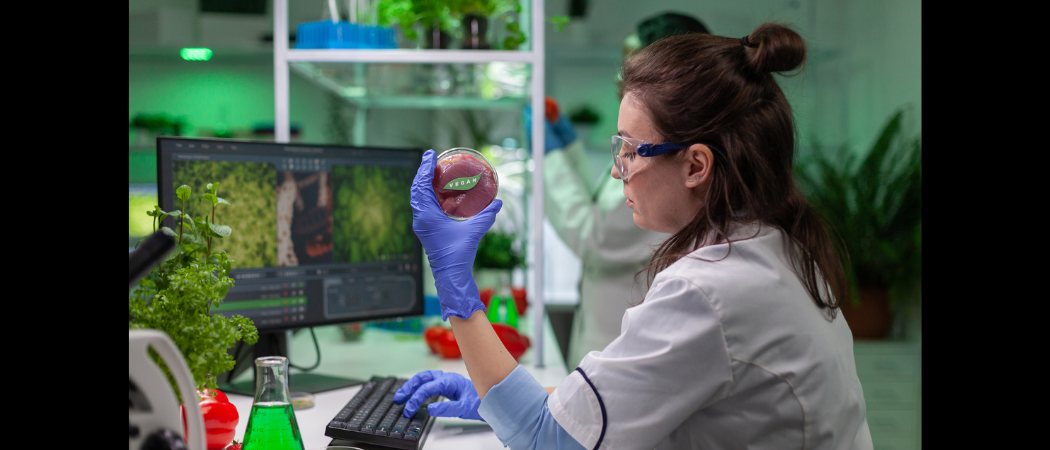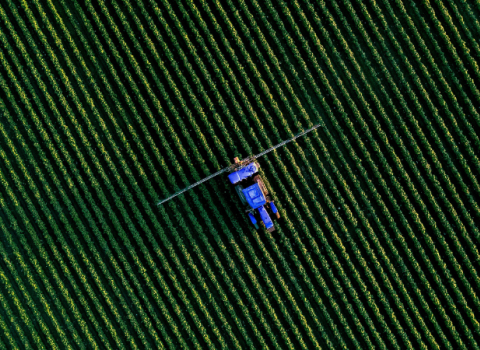Europe is home to some of the world’s most innovative food companies creating alternative proteins, but many are choosing to launch their products first in the US or Singapore

If all goes to plan, Dutch start-up Meatable will launch its cultivated meat in the first half of this year.
Meatable is one of Europe’s leaders of cultivating animal cells to generate meat, using fermenters similar to those used in brewing beer, but European consumers won’t find it on the shelves of their local supermarket any time soon.
Like many European novel food companies, Meatable is planning to launch in Singapore, where the approval process is quicker and more efficient. It is then looking to expand to the US, before opening to other regions from 2026.
The company is working with European regulators, but “it is a long and complex process to submit for novel food approval in Europe,” a Meatable spokesman said. It generally takes around three years.
Singapore was the first country in the world to approve the sale of factory cultivated meat to consumers in December 2020, followed by the US in June 2023.
Israel-based Aleph Farms has applied for approval for its cultivated beef in the UK and Switzerland, after being granted approval in Israel, but there are currently no cultivated meat applications under consideration in the EU.
A major difference in Singapore is that companies are given regular guidance while compiling their applications, said Christian Poppe, director of public affairs at Formo, a Germany-based start-up which uses precision fermentation to create cheese and egg alternatives in microbial cell culture.
“You know that when you finally submit, the chances of you having included all relevant safety data are pretty high,” he said.
It is not a case of lower standards, Poppe insists. “They are pretty much the same, because when they drafted their legislation, they specifically looked at European standards.”
Huge asset
Poppe is also a spokesman for Food Fermentation Europe (FFE), an industry alliance launched in 2023 by five fermentation companies, including Formo, to advocate for a more innovation-friendly policy framework.
Europe’s rigorous novel food standards are a “huge asset”, and the industry benefits from the trust they inspire in consumers, Poppe said. “We’re all in favour of upholding these standards.”
This was a common refrain from every industry member who spoke to Science|Business.
Poppe also says the European Food Safety Authority (EFSA) is “super curious and keen to dig into these new technologies”. The problem is the agency is “massively understaffed”, meaning the application and review process takes longer than it needs to.
FFE is calling on the European Commission to give EFSA more resources, and for companies to receive more guidance before submitting their dossiers.
“What we hear from start-ups and SMEs is that there's a very clear pathway for the risk assessment and a path to market in other jurisdictions, and in the EU, that timeline is longer and much more variable, which makes investments complicated,” said Lucie McMurtry, industrial biotechnology manager at the industry body EuropaBio.
An EFSA spokesman said the agency does offer pre-submission advice and is “in constant dialogue with stakeholders” to ensure requirements are clear.
Once it receives an application, it has a fixed legal deadline of nine months in which to complete a risk assessment, but it may stop the clock if further data or clarifications are necessary.
Since novel food regulations were updated in 2018, EFSA has received almost 300 applications, more than from 2002 to 2018. “The rise in workload at EFSA in this area has also been matched by a rise in the number of staff working on novel foods,” the spokesman said.
But more communication about how applicants can access advice is needed, said Kari Tronsmo, open innovation manager at the French multinational food company Danone. There should be more support so that applicants do the right analysis, and do not overspend gathering irrelevant information.
However, once a product is approved in Europe, “it’s kind of a golden pass for the rest of the world,” she said. “The process is so solid, if you’ve gone through it, then you will very easily get approval in other regions as well, so it really is a worthwhile investment.”
Once EFSA has conducted its risk assessment, there is a risk management stage in which the European Commission considers EFSA’s opinion alongside other factors.
The final decision comes down to the Commission and a committee of representatives from all 27 member states. This represents an additional hurdle since the negotiations can become political, rather than purely technical, and often lack transparency.
Vivici, a Dutch start-up specialised in the precision fermentation of dairy proteins, is currently preparing to launch in the US. It is weeks away from declaring self-affirmed Generally Recognized as Safe (GRAS) status, showing that the ingredient and processes are safe based on the conclusions of an expert panel. This will allow it to market its ingredient immediately while the Food and Drug Administration (FDA) evaluates the information.
By comparison, the process in Europe could be “clearer, more predictable, and faster”, says Vivici CEO Stephan van Sint Fiet.
“There is dialogue between EFSA and the industry to improve upon these things,” he said. “As a consumer, I do not want EFSA to cut corners.”
Risk of relocation
Van Sint Fiet believes it is “perfectly possible to operate as a European company in Europe, while not actually marketing your ingredient for the time being in Europe”.
After all, when it comes to sustainability, “Every tonne of sustainably produced protein is a win, it doesn't matter where it goes.”
There is however a risk that if the investment climate and the regulatory environment are unfavourable, companies will relocate their headquarters. “Unfortunately, you've seen many innovative, European biotech companies do exactly that in the past,” van Sint Fiet said.
The US is actively trying to convince European companies to relocate. Poppe says representatives of the US National Security Commission on Emerging Biotechnology have been visiting companies, including Formo, to learn what favourable policy frameworks would make the US even more appealing to them.
The birthplace of cultivated meat
If Europe falls behind other parts of the world, it won’t be for want of expertise. “We have a long biotech and fermentation history that has created a lot of very specific knowhow,” said van Sint Fiet. He cites companies such as Carlsberg which have pushed innovation in yeast fermentation.
“Europe is the birthplace of cultivated meat and is home to half of the world’s top 10 universities, so it should be a global leader in alternative proteins,” said Seth Roberts, policy manager at the international nonprofit and thinktank the Good Food Institute Europe (GFI).
But Europe could fall behind without meaningful public investment and a clear strategy, he said. Instruments such as Horizon Europe should be used to “help scale up and commercialise cultivated meat and precision fermentation”.
Horizon Europe has already committed €25 million to sustainable proteins research, while the Circular Bio-based Europe joint undertaking also supports research into alternative proteins. This covers not just novel foods but also other sources of protein such as algae and insects.
The Commission was due to propose a sustainable food systems law, as well as a new protein strategy, early this year, but these are no longer expected before the European elections and do not feature in the 2024 work programme.
The Commission will however present a biotech and biomanufacturing initiative, which “has the potential to strengthen the connection between biomanufacturing and the food sector and could position Europe as a driving force in alternative proteins,” said Roberts.
EuropaBio is also eagerly awaiting that initiative, as well as changes to the EU’s taxonomy regulation, which defines investments which are considered sustainable. The list of sustainable activities is gradually being updated and should eventually include criteria for food production.
“If novel foods are seen as substantially contributing to the environmental objectives of the taxonomy regulation, then that would boost investment into those sectors,” said McMurtry.
Italian ban
National governments are sending mixed signals. The Netherlands, for example, has been a pioneer in investing in alternative proteins, and recently became the first EU country to allow cultivated meat tastings prior to approval.
For start-ups in particular, this will allow them to refine their product, and to demonstrate to investors that there will be a consumer market and to raise funds to scale up.
In November 2023, Italy voted to ban cultivated meat altogether. Last week, the European Commission informed Italy that it had breached EU law since it did not give member states and the Commission sufficient notice to comment on potential barriers to the internal market. The future of the ban is now uncertain.
The Italian government fears synthetic meats pose a threat to Italian culture and tradition, a claim which McMurtry rejects. “We need to sustainably diversify our food systems, and so we need all possible solutions, including the traditional ones,” she said.
A lack of infrastructure is another barrier. There are some facilities, such as the Bio Base Europe Pilot Plant in Belgium, and Extracellular’s recently inaugurated contract pilot facility in Bristol, UK, which will offer companies access to facilities and expertise.
“If Europe is to compete with other regions, we need governments and businesses to invest in more of these facilities,” said Roberts.
Poppe agrees policymakers “need to recognise the potentials of biotechnology” and provide greater subsidies for the creation of competitive European infrastructure.
In a recent report, a European Institute of Innovation and Technology (EIT) think tank called for more public investment in R&D and infrastructure, and a Horizon Europe partnership on protein diversification.
Alternative proteins offer significant environmental advantages. Cultivated meat promises a 92% reduction in greenhouse gases, and uses 95% less land, and 78% less water than conventional beef, according to a life cycle assessment from consultancy CE Delft.
As well as the approval process, advocates for alternative proteins are calling for changes to labelling requirements. For example, in Europe, Formo would not be able to refer to its products as “creamy” or “animal-free dairy”.
“We are far away from being able to call our product something that helps consumers understand what they have in front of them,” Poppe said.





 A unique international forum for public research organisations and companies to connect their external engagement with strategic interests around their R&D system.
A unique international forum for public research organisations and companies to connect their external engagement with strategic interests around their R&D system.